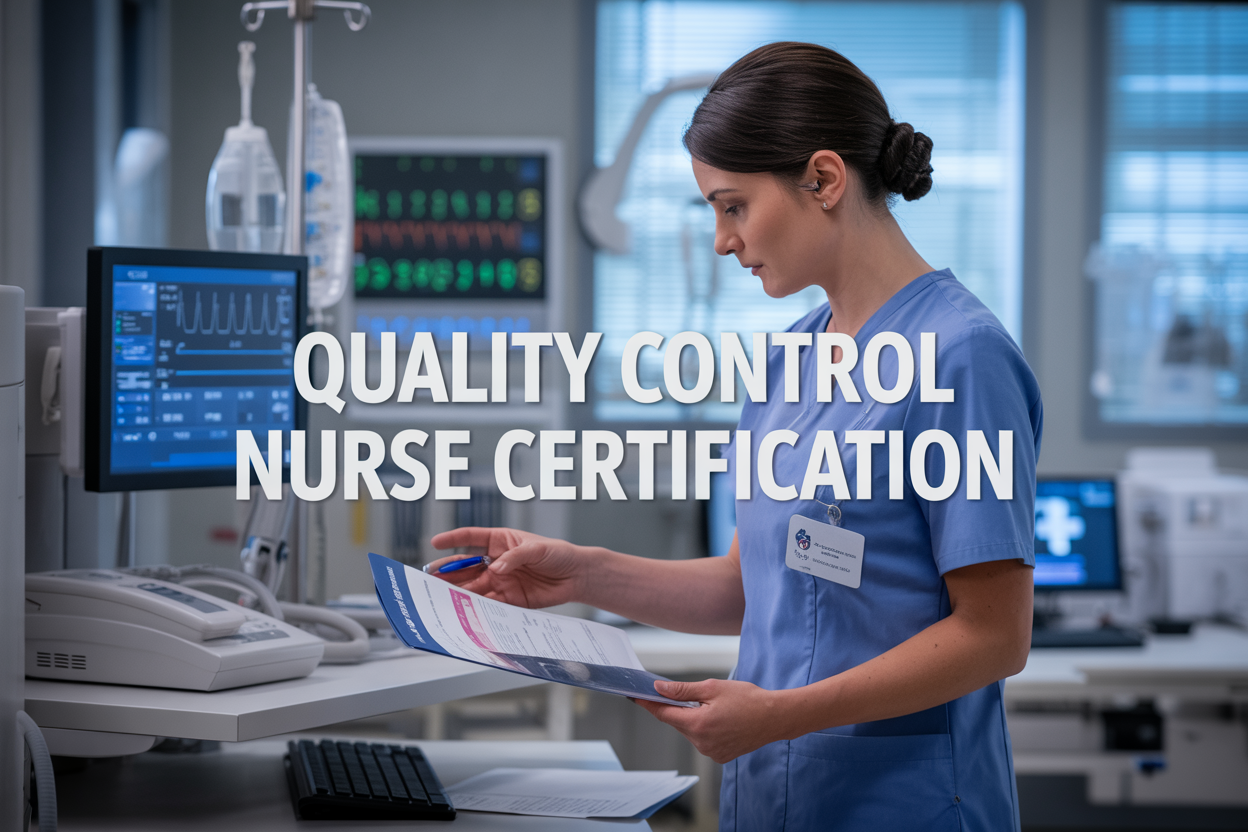
Quality control nurse certification opens doors to specialized roles where nurses directly shape healthcare standards and patient safety outcomes. This certification is designed for registered nurses ready to move beyond bedside care into quality assurance, risk management, and healthcare improvement roles.
Getting certified as a quality control nurse means you’ll master evidence-based practices that make healthcare systems work better for everyone. We’ll walk through the specific certification requirements you need to meet, including education, experience, and exam preparation. You’ll also discover the expanded career paths this credential creates, from quality improvement coordinator positions to healthcare compliance roles that offer both professional growth and competitive salaries.
Most importantly, we’ll explore how quality control nurses create real change in patient care through systematic monitoring, data analysis, and implementation of safety protocols that save lives.
Understanding Quality Control Nurse Certification Requirements

Essential Educational Prerequisites and Clinical Experience
Quality control nurse certification demands a solid foundation in nursing education and hands-on experience. Most certification programs require candidates to hold an active RN license with a minimum bachelor’s degree in nursing from an accredited institution. Beyond basic education, aspiring quality control nurses need at least two to three years of direct patient care experience in acute care settings. Many programs also value specialized experience in areas like infection control, patient safety, or risk management. Clinical experience in quality improvement projects or participation in multidisciplinary healthcare teams strengthens applications significantly.
Core Competencies and Skill Assessments
The certification process evaluates critical competencies that define effective quality control nursing practice. Candidates must demonstrate proficiency in healthcare data analysis, statistical interpretation, and performance measurement methodologies. Strong communication skills are essential for presenting findings to diverse stakeholders and facilitating quality improvement initiatives. Technical competencies include understanding regulatory compliance frameworks like Joint Commission standards, CMS requirements, and OSHA guidelines. Assessment methods typically include written examinations covering quality management principles, case study analyses, and practical demonstrations of quality monitoring techniques. Leadership capabilities and project management skills receive particular emphasis during evaluation.
Certification Body Standards and Accreditation Process
Professional organizations like the American Organization for Nursing Leadership (AONL) and the National Association for Healthcare Quality (NAHQ) oversee quality control nurse certification standards. These bodies establish rigorous criteria for educational programs, examination content, and continuing education requirements. The accreditation process involves comprehensive review of curriculum standards, faculty qualifications, and student outcome measures. Certification maintenance requires ongoing professional development through approved continuing education units, typically ranging from 30-45 hours every three years. Some programs also mandate participation in quality improvement projects or peer review activities. Regular audits ensure certification programs maintain alignment with evolving healthcare quality standards and industry best practices.
Key Responsibilities That Drive Healthcare Excellence

Implementing Evidence-Based Quality Improvement Protocols
Quality control nurses design and roll out protocols backed by the latest research and clinical evidence. They analyze patient data trends, identify areas needing improvement, and create systematic approaches that deliver measurable results. These protocols often include medication safety initiatives, infection prevention strategies, and care pathway standardization. Nurses track outcomes meticulously, adjusting protocols based on real-world performance data to maximize patient safety and care quality.
Conducting Risk Assessment and Patient Safety Audits
Regular audits form the backbone of proactive healthcare safety management. Quality control nurses examine workflows, review incident reports, and conduct spot checks across different departments. They identify potential hazards before they become actual problems, from equipment malfunctions to communication breakdowns. These audits include chart reviews, observation of clinical practices, and analysis of near-miss events. The findings drive targeted interventions that prevent adverse events and strengthen overall safety culture.
Leading Multidisciplinary Quality Enhancement Teams
Effective quality improvement requires collaboration across all healthcare disciplines. Quality control nurses coordinate teams that include physicians, pharmacists, administrators, and support staff. They facilitate regular meetings, manage project timelines, and ensure everyone stays focused on shared goals. These nurses excel at translating complex quality metrics into actionable steps that different departments can implement. They also mediate conflicts and maintain momentum when teams face challenges or resistance to change.
Monitoring Compliance with Healthcare Standards and Regulations
Healthcare organizations must meet stringent requirements from multiple regulatory bodies. Quality control nurses serve as compliance watchdogs, staying current with evolving standards from The Joint Commission, CMS, and state health departments. They conduct internal assessments, prepare documentation for external surveys, and train staff on regulatory requirements. When deficiencies arise, they develop corrective action plans and monitor implementation to ensure sustained compliance. This ongoing vigilance protects organizations from sanctions while maintaining high care standards.
Career Advancement Opportunities and Professional Growth

Specialized Leadership Roles in Healthcare Organizations
Quality control nurse certification opens doors to prestigious positions like Chief Quality Officer, Director of Patient Safety, and Quality Improvement Manager. These roles put certified professionals at the forefront of healthcare transformation, leading interdisciplinary teams and implementing system-wide improvements. Organizations actively seek certified quality control nurses for regulatory compliance positions, risk management roles, and accreditation coordination. The certification demonstrates expertise in data analysis, process improvement methodologies, and regulatory standards that healthcare executives value.
Higher Salary Potential and Job Market Demand
Certified quality control nurses command premium salaries, typically earning 15-25% more than their non-certified counterparts. Hospital systems, insurance companies, and consulting firms compete for qualified professionals, creating a robust job market with excellent negotiating power. The Bureau of Labor Statistics projects strong growth in healthcare quality roles, driven by increased focus on patient safety and value-based care. Remote opportunities and consulting positions expand earning potential beyond traditional healthcare settings.
Continuing Education and Advanced Certification Pathways
The quality control nursing field offers multiple advancement routes through specialized certifications and advanced degrees. Professionals can pursue Certified Professional in Healthcare Quality (CPHQ), Six Sigma certifications, or Master’s degrees in Healthcare Administration. Professional organizations provide ongoing education through webinars, conferences, and peer networking opportunities. Many employers offer tuition reimbursement for continued learning, recognizing the direct correlation between staff education and improved patient outcomes. These pathways create clear career progression from bedside nursing to executive leadership positions.
Direct Impact on Patient Outcomes and Healthcare Safety

Reducing Medical Errors Through Systematic Quality Measures
Quality control nurses implement standardized protocols that catch potential errors before they reach patients. Their systematic approach to medication verification, procedure checklists, and documentation review creates multiple safety checkpoints. These nurses analyze incident reports, identify patterns in near-misses, and develop targeted interventions. By establishing clear quality metrics and monitoring compliance rates, they transform reactive error reporting into proactive prevention strategies that protect patients from preventable harm.
Improving Patient Satisfaction and Care Coordination
When quality control nurses streamline communication between departments, patients experience smoother transitions and better-coordinated care. They audit patient feedback surveys, identify service gaps, and work with teams to address concerns quickly. These professionals ensure discharge planning starts early, medications are reconciled properly, and follow-up appointments are scheduled efficiently. Their focus on process improvement directly translates to shorter wait times, clearer communication, and patients who feel heard and valued throughout their healthcare journey.
Enhancing Clinical Decision-Making Through Data Analysis
Quality control nurses transform raw healthcare data into actionable insights that guide clinical practice. They analyze infection rates, readmission patterns, and treatment outcomes to identify trends that might escape busy clinicians. Their reports help physicians make evidence-based decisions about treatment protocols and resource allocation. By creating dashboards and presenting findings in accessible formats, these nurses bridge the gap between complex data and practical clinical applications that improve patient care.
Creating Sustainable Safety Cultures in Healthcare Settings
Building a culture where staff feel comfortable reporting errors requires deliberate effort and skilled leadership. Quality control nurses lead safety huddles, facilitate root cause analyses, and celebrate teams that identify potential hazards. They develop training programs that emphasize learning over blame, making safety discussions part of daily routines. Through their consistent messaging and supportive approach, these nurses help create environments where continuous improvement becomes second nature and patient safety remains everyone’s top priority.
Career Advancement Opportunities and Professional Growth

Specialized Leadership Roles in Healthcare Organizations
Quality control nurse certification opens doors to prestigious positions like Chief Quality Officer, Director of Patient Safety, and Quality Improvement Manager. These roles put certified professionals at the forefront of healthcare transformation, leading interdisciplinary teams and implementing system-wide improvements. Organizations actively seek certified quality control nurses for regulatory compliance positions, risk management roles, and accreditation coordination. The certification demonstrates expertise in data analysis, process improvement methodologies, and regulatory standards that healthcare executives value.
Higher Salary Potential and Job Market Demand
Certified quality control nurses command premium salaries, typically earning 15-25% more than their non-certified counterparts. Hospital systems, insurance companies, and consulting firms compete for qualified professionals, creating a robust job market with excellent negotiating power. The Bureau of Labor Statistics projects strong growth in healthcare quality roles, driven by increased focus on patient safety and value-based care. Remote opportunities and consulting positions expand earning potential beyond traditional healthcare settings.
Continuing Education and Advanced Certification Pathways
The quality control nursing field offers multiple advancement routes through specialized certifications and advanced degrees. Professionals can pursue Certified Professional in Healthcare Quality (CPHQ), Six Sigma certifications, or Master’s degrees in Healthcare Administration. Professional organizations provide ongoing education through webinars, conferences, and peer networking opportunities. Many employers offer tuition reimbursement for continued learning, recognizing the direct correlation between staff education and improved patient outcomes. These pathways create clear career progression from bedside nursing to executive leadership positions.
Direct Impact on Patient Outcomes and Healthcare Safety

Reducing Medical Errors Through Systematic Quality Measures
Quality control nurses implement standardized protocols that catch potential errors before they reach patients. Their systematic approach to medication verification, procedure checklists, and documentation review creates multiple safety checkpoints. These nurses analyze incident reports, identify patterns in near-misses, and develop targeted interventions. By establishing clear quality metrics and monitoring compliance rates, they transform reactive error reporting into proactive prevention strategies that protect patients from preventable harm.
Improving Patient Satisfaction and Care Coordination
When quality control nurses streamline communication between departments, patients experience smoother transitions and better-coordinated care. They audit patient feedback surveys, identify service gaps, and work with teams to address concerns quickly. These professionals ensure discharge planning starts early, medications are reconciled properly, and follow-up appointments are scheduled efficiently. Their focus on process improvement directly translates to shorter wait times, clearer communication, and patients who feel heard and valued throughout their healthcare journey.
Enhancing Clinical Decision-Making Through Data Analysis
Quality control nurses transform raw healthcare data into actionable insights that guide clinical practice. They analyze infection rates, readmission patterns, and treatment outcomes to identify trends that might escape busy clinicians. Their reports help physicians make evidence-based decisions about treatment protocols and resource allocation. By creating dashboards and presenting findings in accessible formats, these nurses bridge the gap between complex data and practical clinical applications that improve patient care.
Creating Sustainable Safety Cultures in Healthcare Settings
Building a culture where staff feel comfortable reporting errors requires deliberate effort and skilled leadership. Quality control nurses lead safety huddles, facilitate root cause analyses, and celebrate teams that identify potential hazards. They develop training programs that emphasize learning over blame, making safety discussions part of daily routines. Through their consistent messaging and supportive approach, these nurses help create environments where continuous improvement becomes second nature and patient safety remains everyone’s top priority.
Certification Process Steps and Success Strategies

Exam Preparation Resources and Study Materials
Professional nursing organizations like ANCC and CCI offer comprehensive study guides, practice exams, and online preparation courses specifically designed for quality control certification. Many successful candidates recommend combining textbook resources with interactive modules and peer study groups. Mock examinations help identify knowledge gaps early, while specialized review courses provide focused content on quality improvement methodologies, patient safety protocols, and regulatory compliance standards.
Application Timeline and Documentation Requirements
Begin the application process 3-6 months before your intended exam date to allow adequate preparation time. Required documentation typically includes current RN license verification, transcripts showing bachelor’s degree completion, and detailed employment records demonstrating quality control experience. Most certification bodies require 2,000-4,000 hours of relevant work experience within the past three years. Submit applications with official transcripts, supervisor recommendations, and continuing education certificates to meet eligibility requirements.
Maintaining Certification Through Ongoing Professional Development
Quality control nurse certifications require renewal every 3-5 years through continuing education units and professional development activities. Attend quality improvement conferences, complete specialized training programs, and participate in workplace quality initiatives to earn required contact hours. Many organizations accept webinars, journal article reviews, and committee participation toward renewal requirements. Document all professional development activities throughout your certification period to streamline the renewal process and demonstrate ongoing commitment to healthcare excellence.
Quality Control Nurse Certification: Ensuring Safer, Smarter Healthcare
In modern hospitals, Quality Control Nurses play a vital role in maintaining high standards of patient safety and healthcare performance. If you’re a nurse aiming to move beyond clinical duties and take part in improving hospital systems, the Quality Control Nurse Certification from Global A1 Institute of Paramedical Science is the right step forward.
Our online recorded course helps you master quality assurance methods, patient safety protocols, hospital audits, and NABH standards — all at your own pace, from anywhere.
Why Choose Global A1 Institute of Paramedical Science?
✅ Learn from specialist doctors and healthcare quality experts
✅ Online recorded sessions with lifetime access
✅ Active doubt-solving community for guidance
✅ Affordable course fee with flexible EMI options
✅ ISO-certified and career-oriented program
Upgrade your nursing profile and become the voice of quality in healthcare.
👉 Enroll today in the Quality Control Nurse Certification at Global A1 Institute of Paramedical Science and lead the change toward safer, smarter hospitals!
Author
-

Dr. Sunil Saini is a distinguished orthopedic surgeon with expertise in cosmetic limb lengthening, deformity correction, and Ilizarov surgery. With a career spanning over two decades, he has made significant contributions to the field of orthopedics, particularly in advanced limb lengthening techniques.
View all posts

